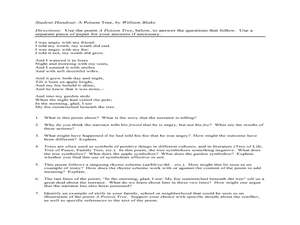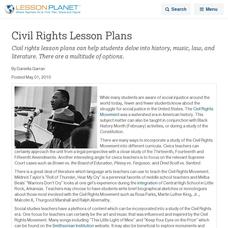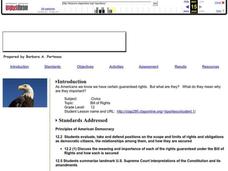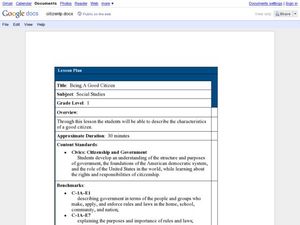Curated OER
Gun Control and Terrorism: Laws or Loopholes?
Students examine the Second Amendment of the Constitution. They research and organize key arguments and other fundementals of gun control. They participate in a debate defending the wording of the Second Amendment.
Curated OER
Property: Ownership, Respect, and Responsibility
Students learn to respect others' property by rating the severity of a variety of damaging acts. Students use a tag board "thermometer" to rate the severity of statements describing situations where a person damages the property of another.
Curated OER
"Tree of Peace": Critical Thinking About Revolution to Global Conflict
Tenth graders explore the importance of peace in society. In this Global History lesson, 10th graders create a common vocabulary for the different elements that exist in a peaceful society. Students discover the connections between...
Curated OER
In the Melting Pot
Students work in small groups, each group examining a different aspect of the immigration process (such as visas, work permits, and citizenship exams) or of illegal immigration (such as deportation), to better explain the immigration...
Curated OER
Will the Supreme Court Vouch for Vouchers?
Students investigate past Supreme Court decisions that have centered on education issues and assess the ways in which those decisions have impacted American education. They consider the controversies surrounding the issue of school...
Curated OER
Government Policy and Its Impact on HIV/AIDS
Students examine "President Bush's Emergency Plan for AIDS Relief", identify important U.S. policy events related to AIDS/HIV from the last 25 years and hold a policy debate on the funding for AIDS/HIV programs.
Curated OER
Mayflower Compact
Students explore the Pilgrims and the Mayflower Compact. They practice these concepts by examining the school rules.
Curated OER
Adult Criminal Justice System
Twelfth graders examine the procedures and protections involved in processing an accused person through the criminal justice system. They view a Powerpoint presentation, conduct research, and write a paper describing a crime they have...
Curated OER
Writing A Mission Statement: Part One
Students create an illustration board and Explain symbols in illustration board. They find What Do You Stand For cards and one piece of candy on each desk. Students are instructed not to eat the candy. They find others with similar...
Curated OER
Civil Rights Lesson Plans
Civil rights lesson plans can help students delve into history, music, law, and literature. There are a multitude of options.
Curated OER
Students Speak Up
Young scholars reflect on their use of technology for learning and communication both inside and outside of school. They consider how their math, science, and technology education is preparing them for future success. They discuss...
Curated OER
Separation of Powers
Students examine the separation of powers in local and federal government. Using case studies, they review several instances of separation of powers. After reading the case studies, they write a brief opinion essays supporting their...
Curated OER
Bill of Rights
Twelfth graders list, describe, and illustrate the specific rights guaranteed to individuals and how they are secured. Then they examine landmark Supreme Court cases, such as, Airport Commissioner vs. Jews for Jesus, New Jersey vs. TLO,...
Curated OER
Makes Cents to Me: Penny Drive
St that people have wants and must find ways to get them. In this philanthropy lesson, students understand the ways people get things and arrange a penny drive to help others. Students arrange an artistic project to reflect on their fund...
Curated OER
Citizen Journalism
Learners examine the role of citizen journalism, freedom of the press, and the First Amendment. They analyze the results of an Internet survey, discuss the ethics of downloading copyrighted material on the Internet, and write a news story.
Curated OER
Legal Rights, the Charter, and Canada's Constitution
Students explore the issue of human rights in Canada and compare and contrast the Bill of Rights and the Charter of Rights and Freedoms. They debate whether Canadians are giving up certain democratic rights in exchange for the greater good.
Curated OER
Being a Good Citizen
First graders discuss citizenship. In this being a good citizen lesson, 1st graders complete a worksheet identifying characteristics of a good citizen. Students draw a picture then use a flip camera to capture good classroom citizens.
Curated OER
Decolonization and Self-Determination
High schoolers define and discuss colonialism and self-determination. After reading the European's view on the topic, they analyze a map of imperialism in 1914. They watch excerpts of a video and take notes on various United Nations...
Internal Revenue Service
Fairness in Taxes: How Taxes Affect Us
Students are able to compare the effects of the following, using income as a measure of ability to pay: a progressive tax, a regressive tas, and a proportional tax. They explain how a mixture of regressive and progressive taxes could...
Curated OER
Pandemic Panic
Students gather information about the H1N1 virus, and share this information. In this pandemic lesson students read about Influenza A, or Swine Flu, compile information on the disease, and then present their findings to the class.
Curated OER
Fur Right or Wrong
Students explore the uses for animals in different societies. Then, through research and reflection, students prepare for a mock convention for animal rights. They write a letter to a governmental animal regulatory body.
Curated OER
True Admissions
Students examine affirmative action and study the diversity of their own classrooms and communities, then of a particular college or university. They write essays examining how colleges should increase the diversity of their student bodies.
Curated OER
All Fired Up
Students brainstorm images and themes associated with the American Fourth of July holiday. They create illustrated posters to explain the processes or history behind these themes.
Curated OER
What Is a Neighborhood?
Students be asked to think about the neighborhoods in which they live, to consider what exactly makes up a neighborhood, and the current issues their neighborhood may be facing.

























